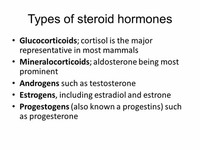Facts about Testosterone

Testosterone has its greatest impact on sexual differentiation during two stages of life: (1) Before birth and (2) during puberty.

Some of these effects may decline as testosterone levels decrease in the later decades of adult life.

Adult testosterone effects are more clearly demonstrable in males than in females, but are likely important to both sexes.

LH acts upon the Leydig cells of the testis to stimulate testosterone production.

Hormone replacement therapy maintains blood testosterone levels in the normal range.

Testosterone is derived from the androgen androstenedione via a reduction of its 17-keto group.

Androgens (such as testosterone) are a major class of steroid hormones responsible for the development of male secondary sex characteristics.

Like other steroid hormones, testosterone is derived from cholesterol, a sterol lipid with the chemical formula C27H45OH.

Luteinizing hormone (LH), which is synthesized and secreted by the anterior lobe of the pituitary gland, functions in the regulation of testosterone levels.

Steroid hormones such as testosterone (and estradiol on the female side) act early in development to organize male or female phenotypes that are activated later (Zysline et al.

On average, the adult male human produces about 20 to 30 times the amount of testosterone synthesized by an adult female (Larsen, et al.

Testosterone and other anabolic steroids were designated a controlled substance by the United States Congress in 1990.

Anabolic steroids, a category which includes testosterone and its derivatives, have also received attention due to their controversial use to increase muscle mass and enhance athletic performance.

Decline of testosterone production with age has led to a demand for androgen replacement therapy, though there is disagreement within the medical community about the efficacy and safety of such treatments.

Women may also use testosterone therapies to treat or prevent loss of bone density and muscle mass and to treat certain kinds of depression.

Greatly differing amounts of testosterone prenatally, at puberty, and throughout life account for a share of biological differences between males and females.

To take advantage of its virilizing effects, testosterone is often administered to female-to-male transsexual men as part of hormone replacement therapy, with a "target level" of the normal male testosterone level.

More recently, testosterone replacement therapy has become available to older men, whose testosterone levels naturally decline with age; however, large-scale trials to assess the efficiency and long-term safety of this treatment are still lacking.

Testosterone is a steroid hormone that acts in vertebrates to regulate many sexually dimorphic traits and express many fitness related traits in males (Zysline et al.

The aggression associated with high levels of naturally circulating testosterone seems to be closely related to reproduction.

Despite known side effects, some have used testosterone and other steroids to gain unfair competitive advantage in sports.

Women may use testosterone to treat low libido, often a symptom or outcome of hormonal contraceptive use.

The male generative glands also contain the Sertoli cells, which require testosterone for spermatogenesis (the synthesis of spermatozoa).

Development of breast tissue in males, a condition called gynecomastia, is usually caused by high levels of circulating estrogen, the result of the increased conversion of testosterone to estrogen via an aromatase enzyme.

Testosterone was originally used for the treatment of males who have little or no natural testosterone production—that is, males with hypogonadism.

Nonetheless, high levels of circulating testosterone have been correlated to aggression in a variety of vertebrate species.

Nonetheless, like men, women rely on testosterone (albeit in significantly smaller quantities) to maintain libido, bone density, and muscle mass throughout their lives.

A experimental study on female dark-eyed juncos, a species of bird, found that exogenously increased testosterone levels led to increased intrasexual aggression (as well as decreased cell-mediated immune function) (Zysling et al.

Testosterone administered to an athlete in order to improve performance is considered to be a form of doping in most sports.

Caution about embracing testosterone replacement therapy stems in part from the lessons of female hormone replacement therapy trials, where initially promising results were later refuted by larger studies.

On average, the adult male human produces about 20 to 30 times the amount of testosterone synthesized by an adult female (Larsen, et al.

Scientists have isolated testosterone and developed procedures for utilizing it medically to treat a wide variety of medical and psychological conditions, including low libido and even depression.

Despite known side effects, some have used testosterone and other steroids to gain unfair competitive advantage in sports.
Testosterone plays a role in certain behaviors, including aggression and dominance. ... Just as sexual activity can affect testosterone levels, taking part in competitive activities can cause a man's testosterone levels to rise or fall. Low testosterone may result in a loss of confidence and lack of motivation.Apr 21, 2014